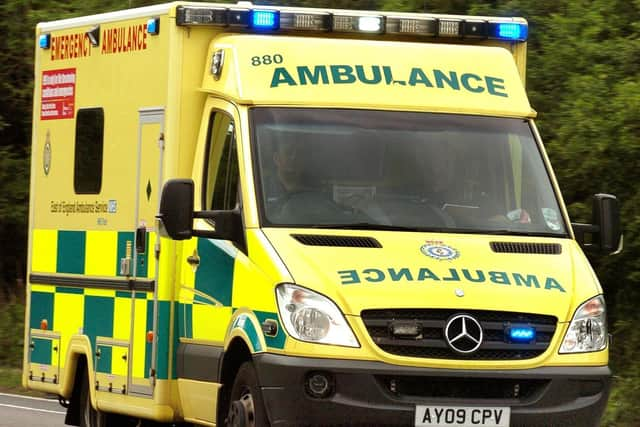Trust ‘eroded’ between GPs and ambulance call handlers over 999 ‘algorithm’, committee in Bedford told
and live on Freeview channel 276
Bedford Borough Council’s Health Overview and Scrutiny Committee brought a leading doctor together with leaders of the East of England Ambulance Service to thrash out the issues at a meeting on Monday (Nov 11).
“I am very uncomfortable criticising my colleagues,” said Dr Peter Graves, chief executive of the Bedfordshire and Hertfordshire Local Medical Committee.
Advertisement
Hide AdAdvertisement
Hide AdHe later told the meeting that he wants to “rebuild trust that’s been eroded” by the way calls are dealt with.


Dr Graves added: “The ambulance service is insisting that a clinician speaks to a call handler when they are dealing with an emergency. We keep being asked the same questions.”
The issue is the ambulance service call handlers, who are not clinical, having to run through a series of questions in order to give patients priority for an ambulance. But the rules state the call must be made by a clinician, who is then taken away from dealing with the patient.
Doctors are also concerned that patients they believe need a fast ambulance response are being left waiting in their surgeries, which stops them dealing with other patients.
Advertisement
Hide AdAdvertisement
Hide Ad“They can be blocking clinical rooms for hours,” Dr Graves added. He said cases from his colleagues included a patient with anaphylactic shock requiring adrenaline. It took more than 45 minutes for the ambulance to arrive in “this life-threatening situation”.
In other “less severe medical emergencies” the patient has waited for more than four hours. These included a patient with severe back pain who couldn’t move in the surgery.
“The ambulance finally came well past our closing time at 6.30pm and so the doctor and a receptionist were left with the patient until nearly 8pm (nearly 10 hours in total).”
In another case reported to the committee, at 9pm some four hours after calling the ambulance one GP considered “moving the patient out to the street outside as there the ambulance would respond quicker.”
Advertisement
Hide AdAdvertisement
Hide AdDr Graves said the situation has been a problem for a number of years.
The ambulance service was represented by Simon King, the head of operations, and Lewis Andrews, the head of quality improvement and professional standards.
They told the committee that the “algorithm” questions were set nationally, but had been changed about five weeks ago in response to GP concerns from across the country.
The call handlers are not clinicians, so they have to ask questions that tease out the information that allows them to decide who gets an ambulance first.
Advertisement
Hide AdAdvertisement
Hide AdMr King said: “We do not yet have the data from the start of the new period.” But he said that the questions were “mandated” at a national level.
Mr Andrews said the ambulance trust is a “learning organisation” and welcomes complaints as a way of ironing out problems.
The committee heard that clinicians are asked to answer a different set of questions compared to members of the general public. “It must be a clinician who speaks to the call handler,” Mr Andrews insisted.
Dr Graves admitted that the number of complaints made by GPs to him recently “seem to have dropped”.
Advertisement
Hide AdAdvertisement
Hide Ad“We hope to see a response to the new system. It frustrates GPs when they have to spend time away from the patient, speaking to someone who clearly does not understand,” he said.
Mr King added: “We don’t have absolute autonomy to turn the questions off but the intention is to ask less questions to clinicians. If the call handlers speak to a lay person, they have to revert to a longer process.
“I do feel your pain,” he added.
The ambulance service and GP representative agreed to speak to each other, with Dr Graves committing to passing on messages to his members.
And the committee agreed to receiving another report in six months’ time to review the data.
And Emma Hunt-Smith, of the Bedfordshire Clinical Commissioning Group, said: “We are working in the background together as a system to try and get things right.”